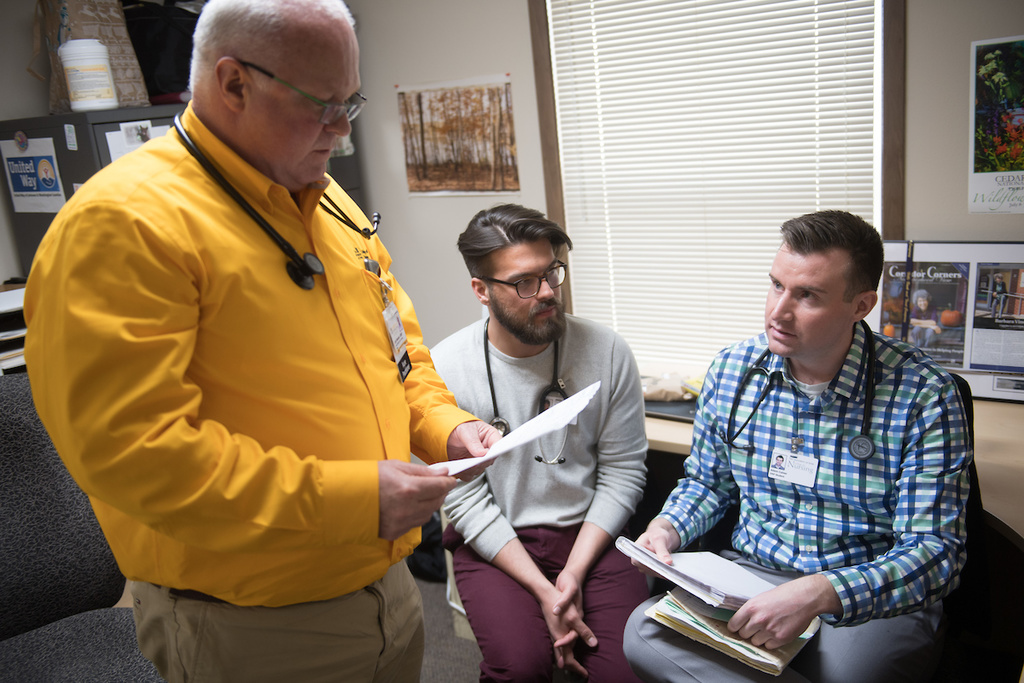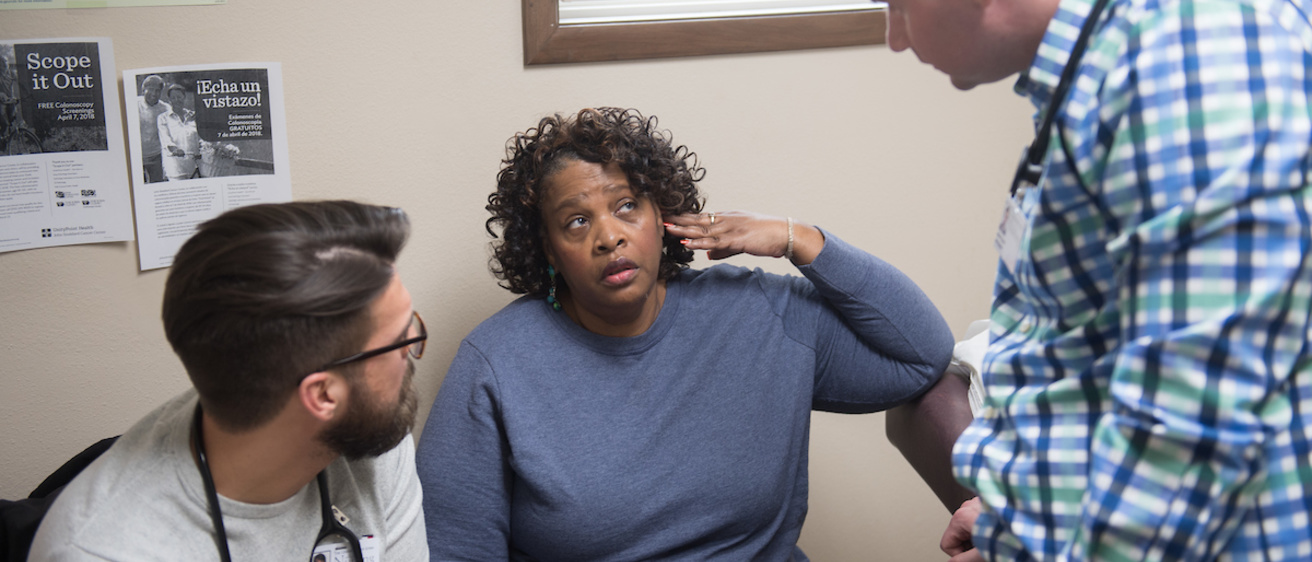A new partnership between the University of Iowa College of Nursing and the Iowa City Free Medical and Dental Clinic (FMC) aims to expand student learning experiences as well as access to medical care for local residents who can’t afford to visit a provider’s office because they have insufficient health insurance or no insurance at all.
The partnership, which began in January 2018, was established after discussions between Larry Newman, an assistant clinical professor of nursing and longtime FMC volunteer, and Barbara Vinograde, the clinic’s executive director. They envisioned a collaboration that would expose nursing students to patients on the fringe of the health care spectrum and expand medical services to those in need, including families on the verge of poverty, newly arrived immigrants, elderly residents, and the homeless.
Just a few months into the partnership, that win-win vision is a reality, and Newman and Vinograde already are talking about extending the collaboration beyond the initial one-year time frame.
“It’s been such a success that I’m already looking for ways to continue the relationship,” says Vinograde, who has worked at the FMC for more than 25 years. “Based on initial results and the increase in the number of patients we can serve thanks to the presence of the nurse practitioner students, I can only see the partnership getting better and better.”
For the FMC, the partnership means the addition of a part-time nurse practitioner to the clinic’s roster of medical and dental providers, most of whom are volunteers, as well as the time and energy of two nurse practitioner students. This boost in personnel is being financed through an anonymous gift made to the clinic. The gift includes a possible one-year extension in funding. The FMC relies on roughly $1.3 million in in-kind services annually to augment its roughly $480,000 operating budget. The State Hygienic Laboratory at the UI, UI Hospitals and Clinics, and the UI College of Pharmacy are among the local institutions that provide in-kind services.
UI College of Nursing Dean Julie Zerwic says she is pleased with the collaboration. She says it will help nurse practitioner students fulfill clinical rotation requirements needed to gain experience and obtain their degree, and that it also will be helpful to those looking to work in public health care settings after graduation.
“This partnership enables us to provide an important service for underserved members of our community who might not otherwise receive medical care,” says Zerwic. “It also enables our students to gain valuable clinical experience in a community health environment before they graduate.”
Newman and two nursing students visit the FMC every Tuesday. They typically see six to eight patients, with students performing patient interviews and initial exams and Newman making final diagnoses and treatment plans. The professor-student team sees patients diagnosed with chronic health conditions such as diabetes, hypertension, asthma, high cholesterol, and thyroid disease, as well as acute health problems. They also conduct women’s health exams, order blood tests, and encourage improved diet and exercise.

Newman says the experience of working with patients at a free clinic is different than working with patients in a traditional medical setting because patients at free clinics are more likely to exhibit advanced disease symptoms due to a lack of regular medical care. He says the experience helps students recognize the signs of disease and be more in-tune with patient needs, including their ability to keep up with a treatment plan and pay for prescriptions.
“To see uncontrolled diabetes is rare when you’re working in a regular medical clinic or hospital where a majority of patients have access to health insurance,” says Newman. “Working at a free medical clinic teaches students to look at the bigger health care picture, and to ask questions and not just assume that their patients can afford prescription medications or costly medical devices. Students also learn about resources that patients can access to get the medications they need to stay healthy.”
On a recent clinic visit, Newman and nursing students Adam Culver and James Kinney, both of whom are enrolled in the College of Nursing’s Doctor of Nursing Practice program, met with LaRhonda James, 62, of Iowa City, to talk about her diabetes treatment and make sure that a recent sinus infection had cleared up.
Culver and Kinney were first to enter the exam room.
“How are you feeling today, Ms. James?” Culver asked as he and Kinney walked in the door.
As Culver posed questions about medications, dosages, and insulin shots, Kinney performed a physical exam. At one point, Kinney asked James whether she was regularly checking her feet. Diabetics can develop numbness and tingling in their feet and hands and are advised to check their feet daily for cuts or abrasions. James responded that she was checking her feet, but added that she had trouble with her insulin shots: She discovered that she was not properly injecting the insulin into her abdomen.
“My twin sister is also diabetic and she told me I was doing it all wrong,” James said. “Can you believe that?”
“So, you weren’t even getting the full benefit of the medicine, were you?” asked Culver. “I’m glad she helped you figure it out,” he added.
After the students had visited with James for about 15 minutes, they briefed Newman. Newman asked some questions of them, including why the students were recommending a glycohemoglobin test, which measures average blood glucose level over the previous three months, and a full set of labs. Culver and Kinney explained their recommendation and reviewed James’s patient file with Newman.
When the three returned to the exam room, they presented the treatment plan to James, who seemed pleased with their recommendations, including a new prescription that would reduce her monthly medical costs.
“You do such a wonderful job here. I have no complaints,” said James. “You take very good care of me, and that means so much to me.”
